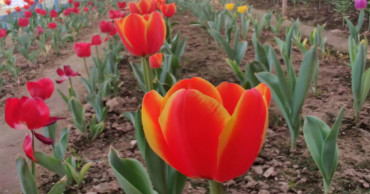Department of Agricultural Extension (DAE)
Unsold surplus production, post-harvest losses for potato farmers amount to Tk25-35 billion
Bangladesh's potato yield is expected to be more than 11 million metric tonnes this year where the domestic demand is only about 7.7 million metric tonnes, according to the Food and Agriculture Organization of the United Nations (FAO).
As only around a quarter of the surplus can be stored for sale, the loss of the farmers due to unsold surplus production and post-harvest losses is estimated at between Tk25-35 billion.
To prevent this significant loss, the government has been encouraging potato exports.
Read: Bangladesh to supply potato to Russia, says Russian Embassy
According to the Department of Agricultural Extension (DAE), more than 480,000 hectares of land were under potato production this year.
Potato producers recently come together to inaugurate this year's exports, a sign of the country's continued success in selling potatoes abroad, the FAO said.
Four potato producer cooperatives joined the inauguration in Pairabandh, Mithapukur – the third annual inauguration in a row.
Guests included Md Sayedul Islam, secretary at the agriculture ministry, and Benojir Alom, director-general of the (DAE).
Private sector exporters and other government extension agency representatives also joined.
Farmers from the northern region of Rangpur have been producing export-quality potatoes by using good agricultural practices (GAP), a collection of principles for safe and healthy farming and processing.
The success of this initiative is due to a partnership between the Sara Bangla Krishak Society, a national network of farmers' organisations, and FAO, under the "Missing Middle Initiative" project.
The project provided GAP training to 100 farmers from four cooperatives. More than half of the farmers were women.
The farmers also received pre-production, inspection, and post-harvest assistance.
FAO organised a pre-season buyer-seller meeting for officials from the Bangladesh Potato Exporters' Association to meet smallholder potato farmers.
Officials from the BPEA liaised with foreign buyers to get specifications and orders.
The potato producers have grown 450 metric tonnes of Santana potato, a high yielding Dutch commercial variety. They were also able to procure seeds from the exporters at an affordable price.
The producers also grew Diamant, Cardinal, Granola, and Asterix varieties which are in high demand in Malaysia, Nepal, Sri Lanka and countries in the Middle East and North Africa.
The Ministry of Agriculture, through the DAE and the Bangladesh Agricultural Development Corporation, has been supporting potato producers to increase export since 2019.
Read:Bangladesh to increase potato export to ensure better price to farmers : Commerce Minister
There are, however, challenges which include meeting export protocols of importing countries, lack of sufficient quantity of preferred varieties, lack of farmer awareness of export quality potato varieties, and finding ways to produce potatoes without quality issues such as hollow hearts, brown rot, or insects.
To address these challenges, the agriculture ministry is sharing GAP with farmers throughout the country.
The formulation of a Bangla GAP policy is almost complete. Work is also in progress to set up advanced laboratories to meet exporters' sanitary and phytosanitary requirements.
FAO Representative in Bangladesh Robert D Simpson said: "To truly thrive, the potato export value chain requires a productive alliance between all involved – the government, private sector, and producer organisations."
"Bangladesh has a lot of potential to grow commercial and export varieties of potatoes, and we are working closely with the Ministry of Agriculture to boost potato exports to strengthen food security and increase incomes for farmers and farming communities."
FAO's Missing Middle Initiative has also supported potato producer cooperatives to establish virtual call centres which help them buy inputs and sell their produce.
Salma Akhter Adury, a virtual call centre operator at Birhim IAPP Farmers' Cooperative, told how she landed an order by sending photos of their potatoes.
"I sent photos of our Santana variety potatoes to the exporters. The exporters were impressed with the high quality, and we received an order for more than 200 metric tonnes for our cooperative from two exporters," she said.
Arif Azad Prince, managing director of MASAWA Corporation, an agro-processing and export company, said the combined effort of the government, FAO, exporters and producer cooperatives have ensured a strong export supply chain.
He said: "Potato producer cooperatives ensured the use of good agricultural practices to grow quality potatoes and collectively sell potatoes to our company."
"We offer a fair price to the farmers, and our importers get shipments as desired. The result is that Bangladesh's potato value chain has a strong reputation among all stakeholders."
3 years ago
Post-pandemic recovery depends on reliable data
The recovery of the country’s economy following the coronavirus crisis is long and slow due to data scarcity, experts say.
5 years ago
Gazipur farmer strikes gold with Tulip farming
Tulip, the spring-blooming ornamental flower famous for its dazzling beauty that usually grows in colder countries, is now laregly being cultivated commercially in Gazipur.
Tulip, the national flower of Turkey and the Netherlands, grows from bulbs. Most tulips thrive in colder winters because of the long-chilling requirement for bulbs.
The flower comes in many colours like orange, pink, cherry, magenta, salmon, crimson, purple, apricot, lilac, mauve, blue, yellow, apricot, violet, terracotta, red, scarlet, chocolate and brown along with many shades.
Delwar Hossain, 50, a farmer of Kewa village in Sreepur upazila, is cultivating the attractive flower in his garden which he named 'Moumita Flowers'.
6 years ago




